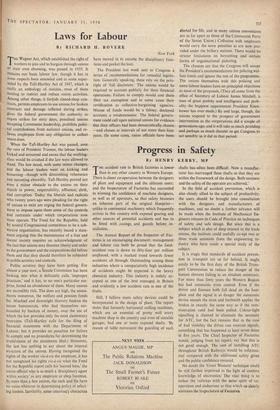Progress in Safety
By HENRY KERBY, MP HE accident rate in British factories is lower I than in any other country in Western Europe. There is closer co-operation between the designers of plant and equipment and the ultimate users; and the Inspectorate of Factories has succeeded in winning the confidence of machine designers, as well as of operators, so that safety becomes an inherent part of the original blueprint— unlike in continental machinery which frequently arrives in this country with exposed gearing and other sources of potential accidents and has to be fitted with ;casings, and guard.s before in- stallation.
The Annual Report of the Inspector of- Fac- tories is an encouraging document; management and labour can both be proud that the fatal- accident rate is down to fifty-four per million employed, with a marked trend towards fewer accidents all through. Outstanding among those industries where a comparatively high incidence of accidents might be expected is the heavy chemical industry. This industry is widely ac- cepted as one of the best managed in Britain and evidently a low accident rate is one of the fruits.
Still, I believe more safety devices could be incorporated in the design of plant. The report states that formerly horizontal milling machines, which are an essential of pretty well every machine shop in the country and even of sizeable garages, had one or more exposed shafts. 'By reason of table movement the guarding of such shafts has often been difficult. Now a manufac- turer has rearranged these shafts so that they are within the framework of the design. Both neatness and the safety of the operator are achieved.
In the field of accident prevention, which is also closely allied to the subject of productivity, the users should be brought into consultation with the designers and manufacturers of machines; and no doubt a further advance will be made when the Institute of Mechanical En- gineers releases its Code of Practice on techniques of safety and safe design. But since this is a subject which is also of deep interest to the trade unions, the institute could usefully co-opt two or three trade unionists from the engineering in- dustry who have made a special study of the subject.
It is tragic that standards of accident preven- tion in transport are so far behind. It ought surely to be the first duty. of the British Trans- port Commission to reduce the danger of the human element failing to an absolute minimum. For more than forty years the Western Region has had automatic train control. Even if the driver and fireman both fall dead on the foot- plate and the signal is at danger the automatic device sounds the siren and forthwith applies the brakes in exactly the same way as if the corn-' muncation cord had been pulled. Colour-light signalling is claimed to eliminate the necessity for ATC, but the fact remains that in the case of bad visibility the driver can overrun signals, something that has happened at least seven times in five years. The Chief Inspector of Factories would, judging from his report, say that this is not ,good enough. The cost of installing ATC throughout British Railways would be infinitesi- mal compared with the additional safety given and the public confidence restored.
No doubt the 'Great Western' technique could be still further improved in the light of modern knowledge of electronic& The vital thing is to imbue the railways with the same spirit of co- operation and endeavour as that which so clearly animates the Inspectorate of Factoriet






































 Previous page
Previous page